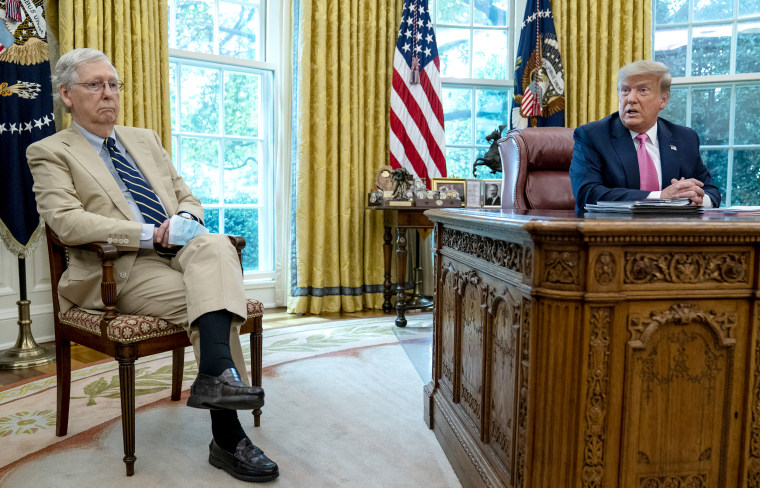No state has been spared the severe economic consequences of the coronavirus pandemic, but the pain in Kentucky is especially acute. The Washington Post reported this week that the Bluegrass State is feeling increasingly desperate, and looking to Senate Majority Leader Mitch McConnell (R-Ky.) to deliver federal aid.In economic aid negotiations, the GOP runs into a post-policy problem
Evidently, the Senate's top Republican -- who happens to be up for re-election this year -- is listening. Yesterday, McConnell, who's taken a passive attitude toward economic aid in recent months, called for bipartisan talks to resume right away.
McConnell, during an interview with Fox News, said it was "time for everybody to get back to the table," though the GOP leader gave no indication that he would reach out to Democratic leaders himself. "The stalemate needs to be ended. It doesn't make any difference who says let's get together again, but we ought to get together again," McConnell said, adding things were currently at an "impasse."
The GOP senator added, "There hasn't been a meeting of any consequences between the two parties since last Friday. That's too long, and it's time to sit down and get a deal done."
On the surface, this can plausibly be seen as a constructive step in the right direction. In the spring, when congressional Democrats were passing an ambitious economic aid package, eager to stay ahead of looming deadlines, McConnell insisted on doing nothing, saying he preferred to "pause" rather than act. Now, evidently, he's eager to "get a deal done."
But there's a difference between endorsing negotiations and actually working on a meaningful, bipartisan agreement. Indeed, the New York Times' Jamelle Bouie raised an important observation this week that too often goes overlooked: McConnell "is very skilled at holding his caucus together for the sake of obstruction but has absolutely no experience crafting and shepherding large, complex legislation, so it is no surprise he's floundering."
Exactly. McConnell may be the Senate's most powerful leader, but he's a hardball tactician, not a legislator. Indeed, in recent months, as the nation tried to deal with a deadly pandemic and its far-reaching effects, McConnell has been largely irrelevant and struggling in his role.
Even when he unveiled what was supposed to be his party's economic aid package in late July, McConnell discovered many of his own members hated the plan.
Things aren't much better at the White House, where officials have not only failed to craft a coherent proposal, they've also botched the negotiations. Much of the problem rests with White House Chief of Staff Mark Meadows, who has developed "an unsurpassed reputation for blowing things up and making sure bills didn't pass."
What we're witnessing, in other words, is a classic example of a post-policy party in a position in which it's supposed to govern responsibly, but it doesn't know how.
The public needs Republican officials to step up, but that would require them to exercise governing muscles that have long since atrophied.
